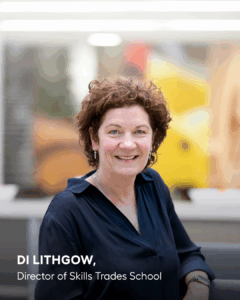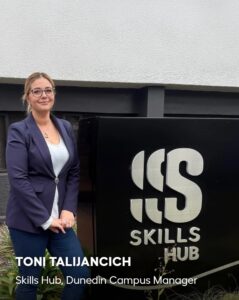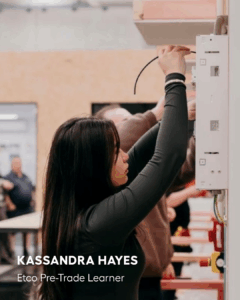At Skills Group, women are driving change and shaping the future of vocational education. Among them are Di Lithgow, Director of Trades School; Toni Talijancich, Dunedin Campus Manager; and Margaret Moala, Campus Delivery Manager – all committed to empowering women in industries traditionally dominated by men.
Di brings over 26 years of experience in work-based learning. “Empowering women in trades isn’t just about employment,” she says. “It’s about building stronger communities and showing the next generation that leadership should look diverse.”
Toni’s pathway into trades was shaped by years in government and workforce development. “I never set out thinking I’d work in trades,” she says. “But trades build communities and offer transformational opportunities.”
Margaret’s career took an unexpected turn after nearly two decades in academia at AUT and the University of Auckland. “My journey began in IT,” she says. “But I felt a pull to explore private tertiary education. The trades sector is the backbone of this country.”
All three leaders see their roles as both a privilege and a responsibility. “Being in a leadership role means I can help bridge the gap between traditional education and hands-on training,” Margaret says.
While they all agree progress has been made, challenges remain. “Women still face cultural and gender biases, limited visibility, and the challenge of balancing family responsibilities,” Margaret says. “But the progress to date is real and empowering.”
Di points to Skills Group’s record number of female apprentices as evidence of change. “Once women reach 25% representation, workplace norms really start to shift,” she says. Toni adds, “We’re seeing companies move from token gestures to real change – improving facilities, offering mentoring, and tackling unconscious bias.” They also challenge outdated ideas about trades. “Trades don’t lack career progression,” Margaret says. “They offer dynamic pathways into leadership, business ownership, and specialist roles.”
Di agrees that trades are highly skilled, well-paid, and increasingly innovative. One Skills Hub Christchurch campus learner, Kassandra Hayes, says hands-on training was the clear choice. “I always felt hands-on learning worked best for me,” she says. “I struggled with reading and writing and thought – why spend thousands on university when I could train in a trade with no debt and work my way up?”
She recently completed her pre-trade electrical course and is now looking for an apprenticeship. “What I love about electrical work is the never-ending opportunities – different types of work, always improving my skills, and knowing it’s a job that will never go out of fashion.”
Margaret’s advice to young women like Kassandra is simple. “Go for it with confidence. The trades offer rewarding, hands-on careers where your skills can make a real impact.”
“Empowering women in trades isn’t just about employment…It’s about building stronger communities and showing the next generation that leadership should look diverse.”




